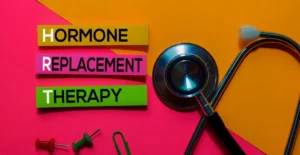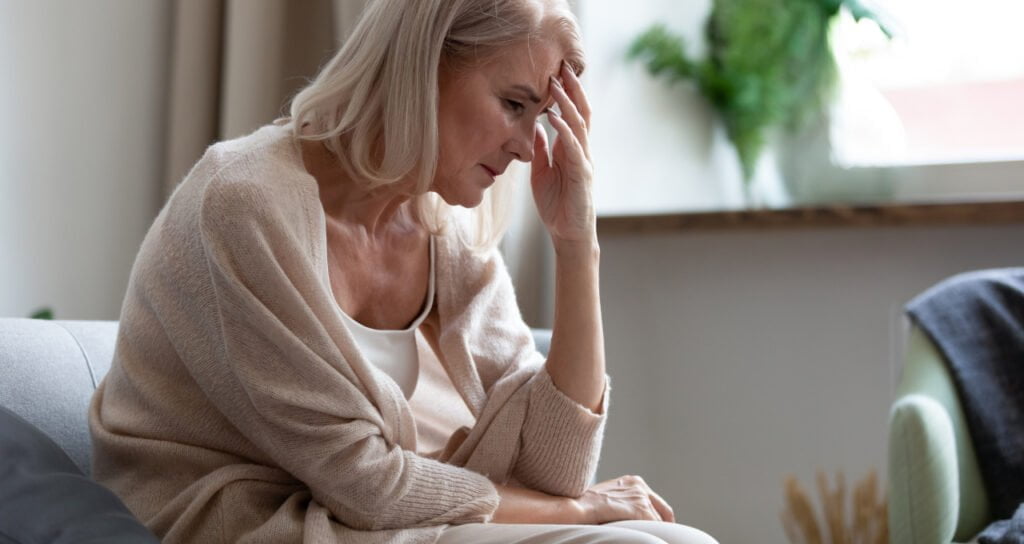Menopause is a natural biological process that marks the end of a woman’s reproductive years. While it comes with a range of physical and emotional changes, one commonly reported symptom is low libido, which can significantly impact a woman’s quality of life and intimate relationships. In this blog post, we will explore the causes of low libido during menopause and discuss various treatment options and strategies to address this issue.
Yes, low libido and menopause are often connected. Menopause is a natural biological process that marks the end of a woman’s reproductive years. It typically occurs in the late 40s or early 50s and is characterized by a significant decline in estrogen and progesterone production. These hormonal changes can lead to a variety of symptoms, and one common concern is a decrease in sexual desire, known as low libido.
Several factors contribute to low libido during menopause:
- Hormonal Changes: The most significant hormonal change during menopause is the decline in estrogen levels. Estrogen plays a crucial role in maintaining the health of the vaginal tissues, promoting blood flow to the pelvic area, and supporting overall sexual function. The decrease in estrogen can lead to vaginal dryness, reduced elasticity, and changes in arousal, all of which can contribute to a decline in libido.
- Physical Symptoms: Menopausal symptoms such as hot flashes, night sweats, and fatigue can affect a woman’s overall well-being and energy levels, impacting her desire for sexual activity.
- Psychological and Emotional Factors: Menopause is a time of significant life transition, and the associated psychological and emotional changes can influence libido. Factors such as stress, anxiety, mood swings, and concerns about body image may contribute to a decreased interest in sexual activity.
- Genital Changes: The hormonal changes of menopause can lead to changes in the genital tissues, including thinning of the vaginal walls and a decrease in natural lubrication. These changes can result in discomfort during sex, further impacting sexual desire.
It’s important to note that not all women experience low libido during menopause, and the severity of symptoms can vary widely. Additionally, factors such as individual health, lifestyle, and relationship dynamics can influence how menopause affects sexual function.
Different Low Libido and Menopause Treatment Options
Addressing low libido during menopause often involves a multifaceted approach. Hormone Replacement Therapy (HRT), lifestyle modifications, psychological support, and communication with a healthcare professional can all play crucial roles in managing and improving sexual function during this life stage. Open communication with a partner, seeking support from healthcare providers, and exploring various treatment options can help women navigate the changes associated with menopause and maintain a satisfying and fulfilling intimate life.
Here are some of the low libido and menopause treatment options:
Hormone Replacement Therapy (HRT)

Hormone Replacement Therapy is a widely used treatment option for managing menopausal symptoms, including low libido. It involves supplementing the body with hormones such as estrogen and, in some cases, progesterone. Estrogen is crucial for maintaining vaginal health, promoting blood flow to the pelvic region, and supporting overall sexual function.
While HRT can effectively address low libido associated with menopause, it’s essential to approach this option with caution. The decision to undergo HRT should be based on an individual’s health history, risks, and benefits. Potential side effects and long-term considerations, such as an increased risk of certain health conditions, should be discussed with a healthcare professional before initiating HRT.
Non-Hormonal Medications
Certain non-hormonal medications have shown promise in treating low libido during menopause. Selective serotonin reuptake inhibitors (SSRIs) and bupropion, commonly used for managing mood-related symptoms, can have a positive impact on sexual desire. These medications work by influencing neurotransmitters in the brain, potentially alleviating emotional factors contributing to low libido.
As with any medication, it’s crucial to consult with a healthcare provider to determine the most suitable option based on an individual’s health profile and potential side effects.
Lifestyle Modifications
Healthy lifestyle changes play a significant role in managing low libido during menopause. Regular exercise, a balanced diet, and adequate sleep contribute to overall well-being, boost energy levels, and positively impact sexual function. Exercise, in particular, enhances blood flow and promotes the release of endorphins, which can have positive effects on mood and libido.
Additionally, avoiding excessive alcohol consumption and quitting smoking can contribute to improved sexual health. Incorporating stress-management techniques, such as meditation or yoga, can also help alleviate the emotional factors associated with low libido.
Psychological Support and Counseling
Seeking psychological support and counseling is a valuable aspect of addressing low libido during menopause. A mental health professional can help individuals navigate the emotional challenges associated with this life stage, providing coping strategies and tools to enhance emotional well-being.
Couples counseling is also beneficial for partners dealing with the impact of menopause on intimacy. Open communication and shared strategies for maintaining a satisfying sexual relationship are essential components of counseling sessions.
Pelvic Floor Exercises and Physical Therapy
Pelvic floor exercises, such as Kegels, can strengthen the muscles in the pelvic area, promoting better blood flow and improving sexual function. Physical therapy may be recommended to address specific issues related to pelvic health, including pain or discomfort during intercourse.
Individuals should consult with their healthcare providers before starting any new treatment regimen to ensure that the chosen options align with their overall health and address their specific concerns. A personalized approach, taking into account both physical and emotional factors, is crucial for effectively managing low libido during menopause.
Vaginal Estrogen Therapy
Vaginal estrogen therapy is a targeted approach to addressing specific symptoms of menopause that contribute to low libido, such as vaginal dryness and discomfort during intercourse. Unlike systemic hormone replacement therapy (HRT), which delivers hormones throughout the body, vaginal estrogen therapy delivers a low dose of estrogen directly to the vaginal tissues.
This treatment typically comes in the form of creams, tablets, or rings. The estrogen helps restore moisture to the vaginal tissues, improving elasticity and reducing friction during sexual activity. By addressing the physical aspects of vaginal health, this therapy can contribute to increased comfort and enjoyment of sexual intimacy.
It’s important to note that while vaginal estrogen therapy is generally considered safe and effective, individuals should consult with their healthcare provider to determine the most appropriate form and dosage for their specific needs. Regular follow-ups with a healthcare professional are essential to monitor the response to treatment and adjust as necessary.
Testosterone Replacement Therapy

While testosterone is often associated with male health, women also produce small amounts of this hormone, and it plays a role in maintaining sexual function and libido. During menopause, there is a decline in testosterone levels, contributing to reduced sexual desire for some women.
Testosterone replacement therapy (TRT) involves supplementing low levels of testosterone with medication. This can be administered through patches, gels, or injections. It’s important to note that the use of testosterone in women is off-label, meaning it’s not specifically approved by regulatory agencies for this purpose. However, some healthcare providers may prescribe it off-label after a thorough assessment of risks and benefits.
Before considering TRT, individuals should undergo a comprehensive evaluation, including hormone level assessments and a discussion of potential risks and benefits. Monitoring for side effects and adjusting the dosage as needed is crucial. TRT is not suitable for all women, and its use should be tailored to individual health conditions.
Herbal Supplements and Alternative Therapies
For those seeking alternative or complementary approaches to traditional medical treatments, herbal supplements, and alternative therapies may offer some relief from low libido during menopause. Certain herbs and plant-based supplements are believed to have properties that can positively impact sexual function and overall well-being.
Examples of herbs commonly associated with potential benefits for sexual health include ginseng, maca root, and Tribulus terrestris. These herbs are thought to influence hormonal balance, improve energy levels, and enhance sexual desire. However, it’s crucial to approach these supplements with caution, as scientific evidence supporting their efficacy is often limited, and their safety is not well-established.
Sources To Get Low Libido and Menopause Treatment
Finding reliable information and resources on low libido and menopause treatment is crucial for making informed decisions about one’s health. Here are some reputable online sources that provide information and guidance on menopause and related topics:
- HerMantra: HerMantra’s website is a reputable source for medical information. They offer comprehensive articles on menopause, its symptoms, and various treatment options, including information on hormone replacement therapy and lifestyle modifications.
- WebMD: WebMD is a widely recognized online health information platform. Their articles on menopause cover a range of topics, from symptoms to treatment options, providing practical insights and expert advice.
- National Institute on Aging (NIA): The NIA, a part of the National Institutes of Health (NIH), offers resources on menopause and aging. Their website provides evidence-based information on hormonal changes, health considerations, and available treatments.
- North American Menopause Society (NAMS): NAMS is a leading organization dedicated to menopause-related research and education. Their website offers resources, publications, and information on treatment options for menopausal symptoms, including low libido.
- Women’s Health.gov: This government website provides information on women’s health, including menopause. It covers a range of topics related to hormonal changes, treatments, and general well-being during menopause.
- American College of Obstetricians and Gynecologists (ACOG): ACOG’s website is a reliable source of information on women’s health issues. They guide menopause symptoms, hormone therapy, and lifestyle recommendations.
- Healthline: Healthline is an online health platform that covers various aspects of menopause, including articles on low libido and available treatments. The website offers easy-to-understand information backed by medical experts.
Always consult with a healthcare professional for personalized advice and treatment recommendations based on individual health conditions. These online sources can serve as valuable starting points for obtaining general information and understanding various aspects of menopause and low libido.
Conclusion
In conclusion, addressing low libido during menopause involves a holistic approach that considers both physical and emotional factors. With options ranging from Hormone Replacement Therapy to lifestyle modifications and psychological support, individuals have diverse avenues for reclaiming their sexual well-being. It is essential to consult healthcare professionals, access reputable online resources, and engage in open communication with partners. By embracing a comprehensive strategy, women navigating menopause can not only manage low libido effectively but also foster healthier relationships and overall well-being during this significant life transition.
If you are facing menopause-related issues, menopause treatment at HerMantra can help. Book your free trial online menopause treatment session now.



